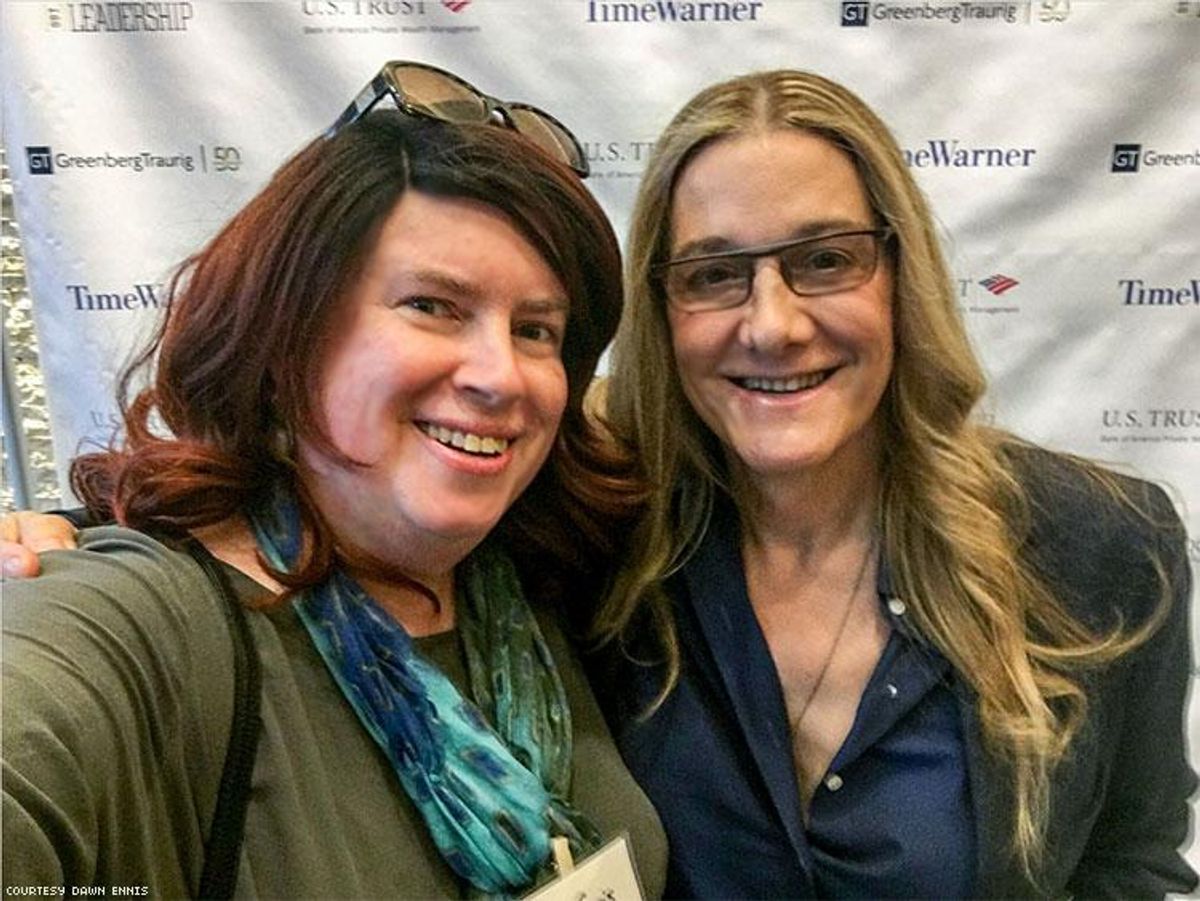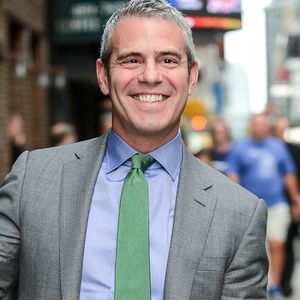Martine Rothblatt is not a transgender Tony Stark -- for instance, she's far too selfless. But given that both are superhero multimillionaires who can fly, the comparison is not far off.
The key difference is that the suit Rothblatt wears is a pantsuit, and hers only takes flight when she pilots her private helicopter. But the argument can be made that this woman is a superhero, having saved the lives of her youngest daughter and countless others by developing a drug to treat a rare, deadly disease. Before that, she invented a way for drivers across the nation to connect with orbiting satellites. And she runs a company that is at the forefront of technology that aims to 3-D print human organs for transplant patients.
Rothblatt also started her own religion. And her plans for the future are literally out of this world.
Earning in excess of $38 million a year, Rothblatt, 63, has been one of the richest female CEOs in America since 2014. She's not just a pioneer in business, either. She came out as transgender decades ago, back when Caitlyn Jenner joined the Kardashian clan.
This past week, Rothblatt spent two days in New York City attending Out Leadership's U.S. LGBT+ Summit, in order to share her insight on inclusion, entrepreneurship, and how business leaders can be better corporate citizens.
At 6 feet 2 inches, she is not one to blend into a crowd, even though what she wore to the summit was similar in shade to the dark blue and gray suits worn by the mostly male attendees. There, even the women seemed shy of bold colors, favoring it-goes-with-everything black. Rothblatt's charcoal pantsuit -- custom tailored, as she once told TheWashington Post, because "women's clothes don't really fit me, men's clothes don't really fit me" -- framed a smart navy button-down top that was three-buttons unbuttoned. She is blessed with a long blond mane, which she wears in either a tight bun or ponytail as she did Thursday, or draping her shoulders, as she did when she sat down with The Advocate Friday.
I approached her -- some might describe it as an "ambush," but I tried to make it a polite ambush -- as she left the stage. After I introduced myself, Rothblatt agreed to a spur-of-the-moment, five-minute sit-down in a noisy corner of the conference center, 10 stories above Columbus Circle.
Although I had been warned "she doesn't do interviews" -- after making the rounds in 2014 when her company hit it big, she was rewarded with transphobic headlines that shouted she "was born a man" -- I found Rothblatt to be both generous and pleasant. She even suggested we take a selfie together first, then asked me questions about my transition and work, before we got to talking about her life. We began with how she transitioned from a Sirius XM executive to launching her own biomedical company, all while undergoing her gender transition.
"Our youngest daughter was diagnosed with a fatal illness, pulmonary hypertension," Rothblatt said of Jenesis, then 5 years old, now 32. "There were no medicines approved. If nothing was done, she was going to die. So I just stopped what I was doing and taught myself biology and pharmaceutical stuff, until finally I found a potential chemical that could be a medicine."
That medicine, Orenitram -- which is MartineRo, spelled backwards -- was approved by the Food and Drug Administration in 2013 in pill form to treat the once hopeless malady, and together with three other drugs now brings in $1.3 billion a year. While far from being a Fortune 500 company, United Therapeutics remains a favorite of investors. Rothblatt herself earned $15.5 million in 2016 and is now sole CEO.
And the money helps fund her other projects, including raising pigs on a Virginia farm with the goal of using them to transplant their lungs into humans and researching a way to recondition human lungs deemed not suitable for transplant, in hopes of doubling the number of lung transplant operations in the U.S.
In addition to being a business leader, Rothblatt is an author and also founded a religion, called the Terasem Movement. One of her sons, Gabriel, is a pastor. It has its roots in her upbringing as an Orthodox Jew -- but more from the cultural side than the religious -- combined with tech and what the Post described as "Zen-like yoga."
"Death is optional" is one of Terasem's teachings.
And to that end, Rothblatt created a robot version of her wife, Bina, or at least, her head and shoulders. The robot is called "Bina48," and has been described by some as creepy -- even Bina48 admits as much -- but it is the closest the Vermont-based entrepreneur has come to cloning the human mind, to create what she calls "artificial consciousness." Her goal, as she explained in her book, Virtually Human, is to write a code for thoughts and emotions and upload them to a computer, thereby creating a digital version of our consciousness that will live on long after we are all gone, perhaps even help humans travel to other planets and stars. Conveniently, Rothblatt is also an expert in "space law."
Life is short, and Rothblatt told summit attendees she felt compelled to speak out against injustices facing the LGBT community, such as North Carolina's House Bill 2. She was initially urged to take up this cause after hearing from her millennial employees.
Rothblatt said she would not hestitate to confront anti-transgender discrimination in her company or its hometown of Silver Spring, Md., or anywhere where trans people are seen as delusional or pretending to be something they're not.
"I would just like slap it right down," she said. "Why would anyone put themselves at the risk of losing their job, losing their family, losing their life, OK? A lot of trans people get killed. Why would anyone do that to be a fake, to pretend to be anything other than who they authentically truly were. It's insane. I would say being trans is the opposite of being fake. It's the most authentic version of almost any human being.
"I feel that more than half of my creativity was unleashed when I didn't have to spend like 90 percent of my energy pretending I was male."
Given we only had a few minutes, Rothblatt did not discuss politics other than to answer the question of what message she'd like to give President Trump, as one successful business person to another.
"I would say thank you for saying to hundreds of millions of people that trans people should feel free to use whatever bathroom is appropriate," she said, possibly forgetting that the day after he made that statement on the campaign trail, a little over a year ago, Trump revised his view, and declared this is an issue he wants left up to individual states.
"For a lot of people," asked The Advocate, "President Trump symbolizes the end of trans rights. Would you agree with that?" In Rothblatt's view, he's a nonfactor in the struggle for equality.
"I think he's kind of irrelevant for trans rights. Trans rights is up to all of us individuals to insist upon, participate in annual Stonewall and Pride marches. Every November, participate in Trans Day of Remembrance for all the trans people who've been lost. I think trans rights is up to us. and that we should never rest, until everybody can be true to their soul no matter what gender that might be."
The soul, according to Bina, is what kept their 37-year marriage from falling apart after she transitioned. Bina revealed to New York magazine what she told Martine: "I love you for your soul, not your skin."
"What does it mean to you to have a supportive spouse?" I asked Martine, reminding her how rare that is.
"Everything. It means everything to me," she replied, a smile on her face. "I am who I am only because I'm like a flower that came out of love, and it's love that makes me who I am." And together they are raising their blended family of four children: Gabriel, Sunee, Jenesis and Elias.
She mentioned what her daughter Jenesis told her, as revealed in a 2015 TED Talk: "I love my dad and she loves me," Rothblatt quoted Jenesis, word for word.
"They love me a lot," she boasted, "and I love them."
Watch a video version of The Advocate's exclusive one-on-one interview with Martine Rothblatt below.


















































































